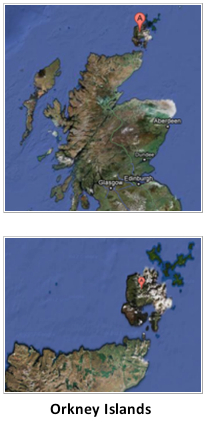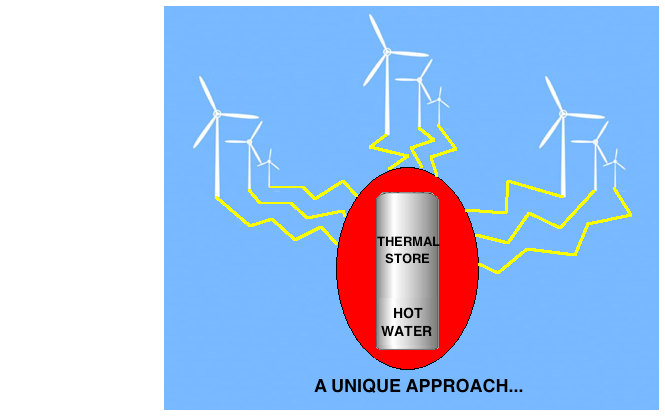

PROJECT BACKGROUND
The Islands of Orkney are situated at the very north of Scotland and are famous across the world for its stunning scenery and wildlife. Additionally, the islands are fortunate to experience high annual wind speeds. For this reason they have become a testing bed for renewable energy systems, in particular wind and wave energy. Unfortunetely, Orkney has poor grid inconnectivity to the mainland of Scotland and many of the wind turbines on the islands are shut down when supply outstrips demand. Additionally, the local council is under pressure to reduce green house gas emissions and match emission targets put forward by the central government.
To combat this the local council has registered its interest in a possible Distrcit Heating Scheme to utilise a proportion of the surplus electricity that is currently going to waste. In principle a district heating scheme would use the electricity generated by the wind turbines on the main island to power a large electrode boiler. To allow for the inherent variability of wind energy the boiler would feed a large thermal store so that hot water can be stored whenever the surplus electricty is available. Each building integrated into the district heating network would require a plate heat exchanger locally to transfer heat from the distribution network to the individual buildings.
PROJECT KEY ELEMENTS
The project will focus on two main district heating scenarios. The first includes two large council owned buildings as the only heating loads. The second scenario is designed to investigate the option of expanded the district heating network to feed further heating loads.
Currently, the majority of the buildings in Orkney are heated using oil-fired boilers. The current cost of oil is approximetely 7 p/kWh and is expected to increase significantly over the next few years. For a district heating scheme to be viable the future cost of heating must be cheaper than that currently experience by the residents of Kirkwall.

In theory, the local council would be responsible for financing the district heating scheme. A financial analysis will be used to predict the payback period that the council could expect with various prices of heat sold to the customer and electricity bought from the utility company. Again, it is vital that the scheme provides heating cheaper than the current cost of 7 p/kWh for oil. The payback period is reliant on the cost of heating charged to the customer and the price of the surplus electricity purchased from the energy company.
A short payback period with prices lower than that given from oil suggests that a district heating scheme is a viable option for Kirkwall. A long payback period suggests that the island should investigate other options for the town of Kirkwall.
Alternatively, a district heating scheme may be more viable if financed by the energy company that owns the wind turbines on the island. This is because the energy company would be provided with the surplus electricity without cost, while the council would have to pay the energy company an agreed fee for the surplus electricity.
THERMAL STORAGE AND WIND ENERGY
The unique area of this project is the analysis of the performance of a large thermal store in partnership with the surplus electricity available from a renewable technology. No other case studies could be found that utilises surplus electricity from wind turbines to power a district heating scheme. This is the unique element of our project and one that could prove valuable for similar projects around the world. One of the main difficulties associated with many renewable energy systems is the inherent variability and difficulty with predicting energy production. A thermal store provides and method of storing this surplus energy that can be used in periods of high demand.

Consequently, an important part of this project is the supply and demand simulations that analyse the performace of the thermal store and surplus electricity in providing heating to the customers in Kirkwall reliably and whenever there is demand. This analysis of the performance of the district heating network, along with a financial analysis of both scenarios will provide Orkney Islands Council with the information neccessary to make an investment decision and decide whether a district heating scheme is a viable option for the town of Kirkwall